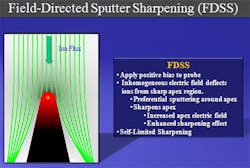Microscope probes get harder and sharper
Researchers led by a professor from the University of Illinois at Urbana Champaign (Champaign, IL, USA) have developed a new method for producing harder and sharper probes for Scanning Tunneling Microscopes (STMs). The result could mean that future microscope systems based on the probes could produce even higher resolution images.
Scanning probe microscopes are widely used among researchers, yet the quality of the data from them depends on the quality of the probes used in them. When probes degrade with use and wear down, the images that are produced via microscopy are compromised.
Unlike conventional probes constructed of silicon or silicon nitride which suffer from tip wear, Professor Joe Lyding's probes have tips that are coated with an extremely hard conductive coating of hafnium diboride and then sharpened to a radius-of-curvature under 5 nm using a proprietary technique called field directed sputter sharpening.
In conventional sputter sharpening, an ion gun is used to shoot high-energy ions to sputter the tips of probes. Material sputters off as the ions collide with the tip, whittling away the probe.
Field directed sputter sharpening builds upon conventional sputter sharpening by adding a positive voltage bias to the tip being sputtered. This creates an electric field that emanates from the tip. Since the electric field is highest at the tip, it repels the ions from it. Locations that have a smaller electric field are therefore sputtered away, but the apex is preserved.
The combination of the hard coating and the sharpness of the probes mean that they will enable users to obtain very high resolution images over long periods of use.
The researchers have received a patent on the technique and have started a company called Tiptek (West Chester, PA, USA) to begin manufacturing probes based on it. They also plan to make Atomic Force Microscope (AFM) probes as well as STM probes. The first of the probes will be available for purchase in late 2012.
-- Dave Wilson, Senior Editor, Vision Systems Design
